
Hundreds of healthcare advocates, together with patients, gathered at the intersection of Santa Monica Blvd. and Vermont Avenue in Los Angeles on May 14, 2025. Photo by Brenda Verano
To protest the recent proposed cuts to Medicaid and Medi-Cal, over 250 healthcare professionals, including doctors, nurses and other healthcare advocates, together with patients, gathered at the intersection of Santa Monica Blvd. and Vermont Avenue in Los Angeles.
The rally on Wednesday is a part of statewide and national campaigns to oppose Republican budget plans that would cut the funding of Medicaid and Medi-Cal, which together cover approximately 83 million low-income households, by about $880 billion.
“ [This] could kick over eight million Americans off their healthcare, all to pay for more tax cuts for billionaires. That may be great news if you're Donald Trump or Elon Musk, but it's devastating for families, for seniors, for Americans with disabilities,” said U.S. Senator of California, Alex Padilla. “I've spoken with families at the Rady Children's Hospital in San Diego who need Medicaid for life-changing care. I've met with California nurses who can attest to how critical Medicaid is to our communities. I've heard stories from hardworking Californians whose families would go bankrupt without the help Medicaid provides. Those Californians aren't just a line item on President Trump's expense sheet.”

Republican budget plans that would cut the funding of Medicaid and Medi-Cal. Photo by brenda Verano
Republicans have also recently introduced new legislation that would tighten income verification requirements and make additional changes to eligibility redetermination procedures. In certain cases, the recently proposed legislation would require recipients to provide proof that they are enrolled in school, working or volunteering in order to be eligible for health coverage.
Dr. Edgar Chavez, founder and chief executive officer of Universal Community Health Center in South Central L.A., which provides quality and accessible healthcare to underserved communities, said Medicaid cuts will disproportionately affect people, among them Latinos, who rely on community clinics to access primary care.
Dr. Chavez established a free community clinic that would eventually become Universal Community Health Center after completing his residency at White Memorial Hospital in Boyle Heights. “As a family physician who grew up in South Central [L.A.], I wanted to start a free clinic to help the community I grew up in,” he told CALÒ News.
He said local clinics, like those that make up Universal Community Health Center, offer more than just health visits; they also offer food pantries and other social services and greatly rely on federal funds to remain open.
“Right now we have six clinics in the area and serve about 15,000 community members a year with more than 70,000 visits. We are growing; we really need support from the federal government to continue the work that we do,” he said.

Dr. Ilan Shapiro, director of medical education and wellness at AltaMed. Photo by Brenda Verano
Approximately 14.9 million Californians, or more than one-third of the state's population, are covered by Medi-Cal, the state's Medicaid program. In California, recent Medi-Cal expansions have opened the health insurance program to the undocumented community. In California, 1.6 million immigrants without legal status are currently enrolled in Medi-Cal. They could also be affected by the potential cuts.
Dr. Ilan Shapiro, director of medical education and wellness at AltaMed, said the cuts in Medicare would cause what he called a “domino effect.”
“The moment we cut Medicare, we have a domino effect; that means that my patients will not get access to clinics. That means that preventable things like diabetes, asthma, and even vaccines will start piling up, which could actually lead to many diseases and problems. Emergency rooms will be packed,” he said. “Right now in California, we have 15 million people depending on Medi-Cal. A lot of them are Latinos. If you unplug this, it’s actually a lifeline; it's not just healthcare insurance.”
L.A. County Supervisor Hilda L. Solis, representing the county’s first district, also made a special appearance via video at Wednesday’s rally. She talked about the importance of standing up against funding cuts to Medicaid, especially in a county where programs like Medi-Cal are an “essential lifesaving component of [the] county's social safety net.”
“About 41% of Los Angeles residents rely on Medi-Cal, and in California alone, over half of our children, one in five workers, and many seniors and individuals with disabilities rely on Medi-Cal for access to critical health services,” she said. “We also know that 82% of Medi-Cal adults are working families, and healthcare is one of the county's fastest-growing employment sectors.”

In California, 1.6 million immigrants without legal status are currently enrolled in Medi-Cal. Photo by Brenda Verano
According to Solis, cuts to Medicaid will destabilize some of the most vulnerable populations in L.A., including homeless folks, women, people with disabilities and seniors.
“These [cuts] will tear healthcare away from our residents who need it the most, including our community suffering from substance use disorders who are more susceptible to overdose deaths; over 900,000 seniors and people with disabilities who rely on Medi-Cal for long-term care and birthing people who rely on Medi-Cal for prenatal and postpartum care; people experiencing homelessness, who rely on Medicaid not only for healthcare but also to address other social determinants of health like housing; and many, many more,” she said.
Angelina Martinez is one of the many people living in L.A. who would be affected by the potential cuts. Martinez and her family have been long-term patients at El Proyecto del Barrio, Inc., a medical clinic in L.A.
“I came to El Proyecto del Barrio as a young adult in search of healthcare for my two elder children. They joined El Proyecto, receiving medical attention that helps with their asthma, tonsil removal, mental wellness and overall well-being,” she said.
Martinez said Medi-Cal has helped her survive through the toughest times for her, including when she and her family caught COVID and when she was diagnosed with an atrial arrhythmia. “During the pandemic of COVID-19, all my household was affected and experienced very severe effects, especially due to the asthma of my three youngest kids,” she said. “Healthcare is not a gift. This is right.”
The jobs of physicians, nurses and even front desk workers could also be threatened due to the reduced revenue for hospitals and doctors' offices caused by lower Medicaid payments.
According to the American Medical Association, 2025 marked the fifth consecutive year of Medicare pay cuts for physicians. The association stated that at the beginning of this year, physicians saw a 2.83% pay cut for the services they provide their Medicare patients.
“The economic pressures have forced some physician practices across the country to close in recent years,” an American Medical Association article stated. “Those that stay open are forced to make hard choices to stay afloat financially and continue seeing patients.”
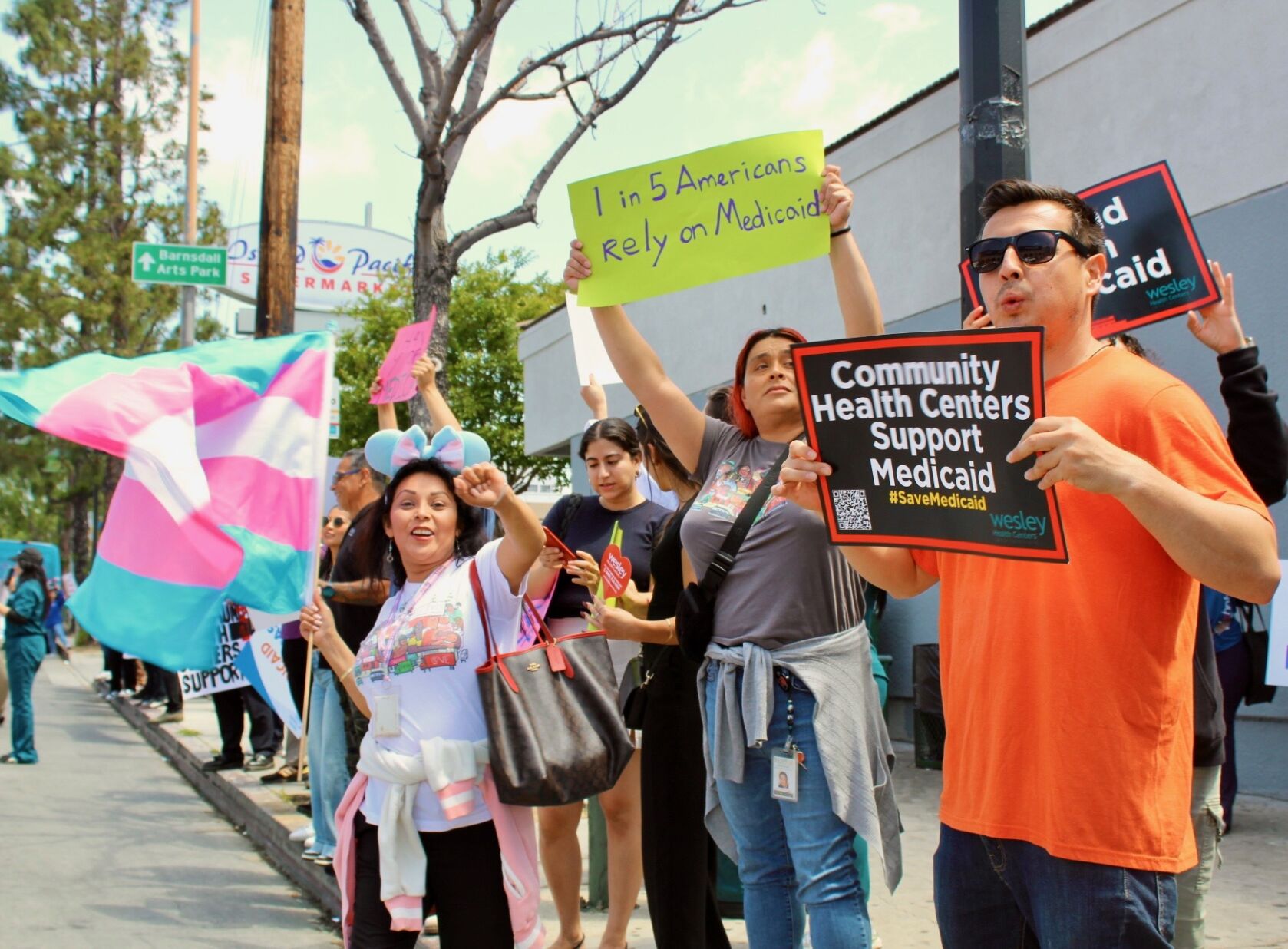
One in five Americans rely on Medicaid. Photo by Brenda Verano
Martha Santana-Chin, chief executive officer of L.A. Care Health Plan, one of the largest public health plans in the U.S., also echoed the potential layoff concerns at Wednesday’s rally.
“Many physicians who have dedicated their careers to helping serve the underserved have their [health] institutions at risk,” she said. “If these cuts go through, they may be put in a position to initiate layoffs, to take dramatic changes to make sure that they're able to keep their doors open.”
Healthcare advocates, including those at Wednesday’s rally, are focused on urging California Republicans in the U.S. House of Representatives, including Ken Calvert, Young Kim and David Valadao, to reject the proposed cuts when the final budget comes up for a vote in the coming months.
On Tuesday, the California Medical Association submitted a letter to the House Energy and Commerce Committee, warning that the bill proposing the cuts would dismantle core elements of the Medicaid program and the Affordable Care Act (ACA).
Francisco Silva, chief executive officer of the California Primary Care Association, who oversees about 1,300 nonprofit community health centers and clinics, said on Wednesday that in many parts of the state, community clinics are the only source of available care.
“We provide care regardless of your age, sexual orientation, immigration status, ethnicity, language, the type of insurance you have or if you even have the ability to pay,” he said. “Whether it’s a threat at the federal level to cut Medicaid, or politically motivated efforts here in California like AB 1113, we stand ready to advocate for the millions of patients who rely on us for their healthcare. We will not be bullied and we will not back down.”

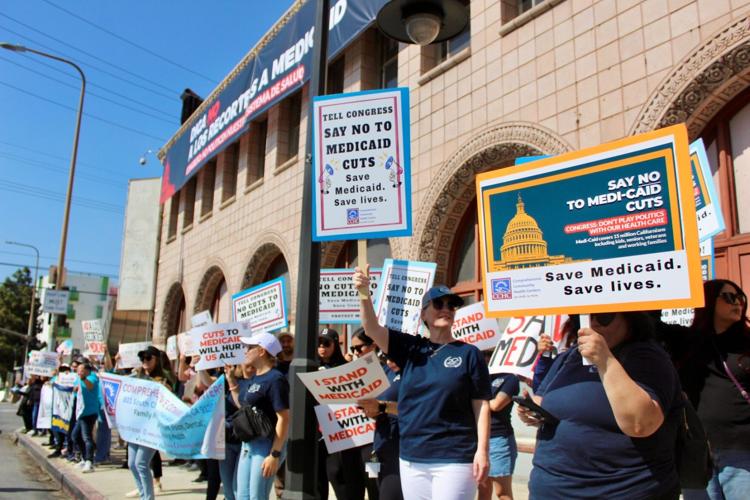
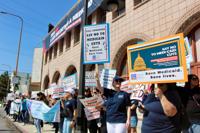

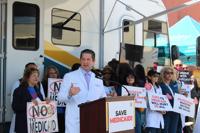

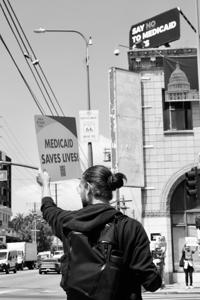
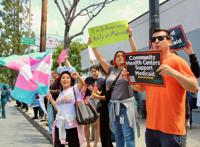

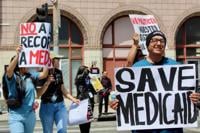

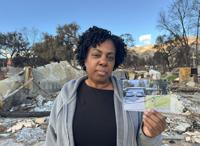

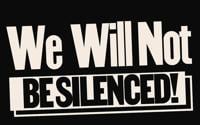

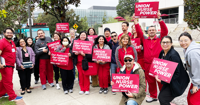

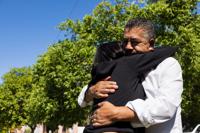
(0) comments
Welcome to the discussion.
Log In
Keep it Clean. Please avoid obscene, vulgar, lewd, racist or sexually-oriented language.
PLEASE TURN OFF YOUR CAPS LOCK.
Don't Threaten. Threats of harming another person will not be tolerated.
Be Truthful. Don't knowingly lie about anyone or anything.
Be Nice. No racism, sexism or any sort of -ism that is degrading to another person.
Be Proactive. Use the 'Report' link on each comment to let us know of abusive posts.
Share with Us. We'd love to hear eyewitness accounts, the history behind an article.